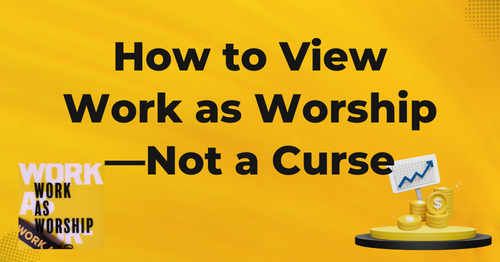
How to View Work as Worship—Not a Curse
Work in any culture is…well, work. Sometimes enjoyable. Often hard and exhausting. Sometimes challenging because of the people with whom you work rather than the work itself. That can apply to any kind of work—inside or outside of your home. When you are working with your God-given skills, all work can be an act of worship. This article will illustrate that truth for you. Not knowing that truth makes you susceptible to the “Work Is Secular” infection.
The Subtle Spread of the “Work Is Secular” Infection
What do I mean by that? Somewhere along the way between the time of the apostles and today, the message regarding work has gotten messed up. We humans look at those on staff with a church or mission agency whether paid or volunteer, and view their work on a higher level than work in any other field.
During your two hours a week at church or in a Bible Study, you might pick up the wrong vibes that the other 166 hours of your week are second-class compared to church stuff. It does not take long to start viewing your work hours as an interruption to “real ministry” and that they lack purpose except to earn income to support the ministry at church. The message often shared by fellow working Christians is that work is something to endure until you can one day do something meaningful (like when you retire and go on the mission field). Those thoughts make you susceptible to the “Work Is Secular” infection. And it can make you heartsick and dissatisfied with 1/3 of your life!
We humans tend to categorize things, and two categories often used are “secular” and “sacred.” By “sacred” we usually mean “Christian-themed” or “suitable for church use,” and by “secular” we usually mean “worldly” or “not having a Christian theme.” That can properly be applied to some things that are outside the realm of the church (like the government) or products of work that are not God-honoring (like some music, movies, or books).
But regarding day to day life, even in those secular organizations or industries, there is no “sacred/secular” division in a Christian’s life. Jesus Christ is living His life in you and through you 24/7 wherever you are. He is living His life through you at home and in the marketplace. So, unless you are doing something definitely sinful with your work, and you can figure out what that would be, every Christian at every level of work is doing sacred work. Seriously! Your time in the weekly worship service, Bible Study, or small group should be your preparation and the stimulus to launch you out into the world—which includes the marketplace—to take the hope of Jesus with you.
That message is so needed in our Christian communities to counter the “Work Is Secular” infection.
Christ Has Purpose for You in Your Workplace
The Holy Spirit inspired Paul to write this truth to all Christians in all time periods,
Whatever you do, work at it with all your heart, as working for the Lord, not for human masters, since you know that you will receive an inheritance from the Lord as a reward. It is the Lord Christ you are serving. (Colossians 3:23-24)
When you are working in an office or on the factory floor, you are serving Jesus Christ with your work. Your everyday run of the mill job can be as much a sacred ministry for the Lord as teaching Sunday School. Your work is an act of worship, not a curse.
Your workplace (be it home, office, factory floor, school room, or road construction) is your mission field. Your work environment is where you must intentionally practice letting Jesus live His life through you—in difficult situations, with challenging people, and with integrity that honors the Lord Jesus Christ.
We spend a great deal of time at work but may not see how our work intersects with our faith. That is understandable since it is rare to hear workplace applications in sermons or see them in Bible Studies (unless they are written for the workplace). No wonder you and I don’t know how to live in our daily mission field. Foreign missionaries spend months preparing for their overseas mission field. But who is preparing you to live for Christ in your workplace mission field?
Some Truths about Any Kind of Work
Truth #1: Work is God’s idea.
God created work in the beginning before sin ever entered into His world (Genesis 1:28; Genesis 2:15). The first thing that God instructed Adam and Eve to do was to work diligently and strategically where He placed them. Work is good. Sin corrupted work. It got a lot harder to do (Genesis 3:17-19). Then, Jesus came along to renew us and restore our approach to work as He lives in us and through us. We are free to work for God’s glory now.
Truth #2: Work is an avenue for accomplishing God’s mission.
When Jesus commissioned His followers— all of them—to make disciples everywhere they went, none of them were on church staff or in mission organizations. Some did become leaders of the new church, but most were ordinary people going to work every day. In the same way, we are Jesus’ ambassadors at work—in the conference room, on the factory floor, at the lunch break, on the playground, and in the kitchen. As we do our work with integrity and intentionally build relationships with our coworkers, clients, or family members, Jesus is actively involved in that. Work is your mission field and your platform to let Christ live His life through you.
Truth #3: Work is the place where God grows us into maturity.
The Spirit of God uses our relationships, successes, failures, and experiences at work as tools in our spiritual growth. He teaches us to have the mind of Christ at work, to treat people as Jesus did, and to grow in our jobs under His guidance. God uses our work to mature us.
For example, do you tend to be kind to your Christian friends on Sunday but mean to your coworkers on Monday? Do you tend to talk about other women behind their backs, especially the other women in your workplace? Are you emotionally miserable and take that out on others around you? Stop those. Don’t be the one bringing “toxic shock” to your workplace, a poisonous condition that is lethal to relationships and to your purpose as a Christian at work. It is also one of the indications of narcissism—another poisonous condition.
Memorize and meditate on Colossians 3:12-17. Ask the Lord to help you recognize any sinful behavior toward your coworkers and choose to represent Christ as Lord of your life instead of yourself. Learn more about this in the Healthy Living Bible Study of Colossians.
Truth #4: Work has purpose beyond ourselves—to create value.
God can do more with our work than we can imagine. God designed work for the good of the world—not just for ourselves. That creates value.
Value creation is the process of turning labor and resources into something that meets the needs of others. That includes, for example, farmers growing crops, workers building something in a factory, as well as other intangible goods like computer code, care for others, and new ideas. (Stefan F. Dieffenbacher Founder, Digital Leadership blog)
Our work impacts the people in our work environment, our clients, and our managers. Work provides jobs, fuels the economy, and allows culture to flourish. When we work, we can taste the goodness of God intended for work in the beginning.
Truth #5: Work is where we practice depending on Jesus more than on ourselves.
In Colossians 3:17, we are reminded to do everything we say or do in light of Jesus as Lord. Jesus is Lord over our work. So, work is worship. And we glorify Him as we do our jobs well.
Human parents rear their children to be less dependent on them and more independent. God grows His children to be less independent and more dependent on Him. Whatever He brings into our lives that makes us more dependent upon Him is good for us.
Work is a great environment to learn how to be a God-dependent woman or man.
Truth #6: Work can become an addiction that takes the focus off of Christ and puts it on yourself instead.
Most companies need employees to be productive, which is a biblical act of worship. And Christians should be the best workers. But you know that you have let work become an addiction when you are obsessively thinking about freeing up more time for your work. When you develop health problems because of work-related stress and over work, that is not working for the Lord.
Another clue is when you use your work to maintain your self-worth. The modern term for that is workism, which I heard about at a women’s ministry leader’s luncheon several years ago.
“Workism” was defined by Derek Thompson a few years ago in The Atlantic as “the belief that work is not only necessary to economic production, but also the centerpiece of one’s identity and life’s purpose, and the belief that any policy to promote human welfare must always encourage more work.” (Discourse Magazine)
The speaker at that women’s lunch went on to say that workism is the belief that your work is the center of your identity. For a Christian, your work is NEVER the center of your identity. Christ is. So, if you recognize this in yourself, go to the Lord and ask Him to free you from the addiction. Talk to a counsellor about this as well.
Work is where you spend 1/3 of your waking hours or more. Work is God’s idea, a means to accomplish His mission, a place for Him to mature us, has purpose beyond ourselves, and helps us practice depending on Jesus more than on ourselves. You can and should build healthy relationships with coworkers because your work is a significant ministry for you as a Christian.
So how do you minister in your mission field at work?
Questions have probably been popping in your mind. How do you live out your faith in your workplace? What is legal for you to do at work? How do you invest in your co-workers without stealing time from your employer? How do you look at work as worship when you hate what you do?
Great questions. Let us explore some answers.
How do you live out your faith in your workplace?
You do that first and foremost by being the person described Colossians 3:12-17. That is recognizing Jesus Christ as Lord of your life and your behavior. Let Him live His life through you to invite others around you to want to know Him. Ask Jesus to help you do that and trust Him to work in you and through you. This includes being responsible employees who are good workers that get their work done in spite of an environment filled with distracting social chatter. Keep reading to see how you can do that and still lovingly invest in your coworkers.
If you as a believer own a business or work for a Christian-owned business, consider being kind to those who apply for a job with your company by giving them a reply and not ignoring them.
What is legal to do at work?
Go to firstliberty.org to find out what is legal for a Christian to do in any workplace. You might be surprised by what you can legally do to live out your faith in the marketplace. And be grateful.
For example, it is legal to invite women to join you for a Bible Study during your workday lunch break. Many employers allow employees to have a lunch break, and one can certainly try to lead a weekly Bible study during that designated lunch break, inviting fellow employees to join. Or employees can meet before the workday begins. It is not legal to force anyone to do this in order to gain your favor at work. I have several Bible Studies that are short and easy and would fit nicely in a lunch hour time frame.
Listen to the podcast, “Launch: Use Your Workday Lunch Break for Disciplemaking.”
How do you invest in your coworkers without stealing time from your employer?
You use whatever break time or interaction opportunities you have available to get to know your coworkers and minister to them. Ask Jesus to help you be creative and caring.
I know someone who has a chair next to her desk. She lets people know that they can come to talk to her during their breaks about anything on their hearts. If it is job-related, they can talk during the work time. Otherwise, she will talk to them during a scheduled break time. That is a good way to live out a caring faith in the workplace.
What about letting your coworkers individually know that you believe in a prayer answering God and would like to pray for them? Simply asking, “How may I pray for you?” Provide a box in your desk area that is closed (even locked) but with a slot in the lid and some pen/note paper nearby so they can write a request and put it through the slot, away from prying eyes. Then, at the end of the day (or during your lunch break), take those requests out to pray for your coworkers. Watch what God does! Then, acknowledge and celebrate the answers with the one (privately, of course) who wrote the request. Maintain confidence about anything shared!
I did not do this at my last office job. But I think my employer would have been fine with it. And I might have had more of an impact on my fellow employees than just being kind and caring in the work environment and privately praying for each of them at home.
Stealing time also applies to your personal activity.
- With the ease of cell phone apps and social media, it is tempting to read a devotional or follow someone’s link to a spiritual blog or article during the workday when one should be concentrating on the job at hand.
- Also included in stealing time is excessive socializing with fellow employees. Be friendly without being a distraction.
Lack of discipline in this way shows a lack of respect for the employer, which certainly does not bring glory to Christ. The Bible teaches that we are do everything as to the Lord and not to humans. That includes being an employee with integrity in our time, words, and mission to benefit the company.
What if you hate what you do for work?
That is where you submit yourself to Jesus Christ as Lord over you and even over that job. Let Him teach you how to be thankful for that work or lead you to something else. Whatever He brings into your life that makes you more dependent upon Him is good for you. As I said before, work is a great environment to learn that.
Remember this.
For a Christian, all of life is an extension of our faith, including the time spent at work and the relationships made there. Your work belongs to Jesus. He will enable you to find purpose in it that brings glory to Him. So, keep working diligently, producing what is needed, providing for yourself and others, and preparing the way for others to see Christ in you.
Even if you are retired from income-producing work, being an intentional light-bearer in your daily life still applies to you. You still have that work to do to spread God’s light into the darkness.
Read or listen to “Counter the “Work Is Secular” Infection.”
RELATED RESOURCES:
Integrity at Work ministry (faith at work for business owners and employees)
No Jerks on the Job by Ron Newton
Your Work Matters to God by Sue Bohlin
Healthy Living Bible Study of Colossians (read online or download pdf)
Don’t Bring Toxic Shock to Your Workplace
How to Glorify Christ in the Workplace



